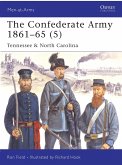Far removed from the main centers of commerce and population, and thus remote from the priorities of Confederate political leaders in the East, the Trans-Mississippi Theater experienced a different sort of war during America's great fratricidal conflict of 1861-1865. Not only was its distance from Richmond a distinguishing factor, but it was also a theater where the Union army and navy gained a foothold far sooner than elsewhere in the South, first in Missouri and then in Louisiana and the Mississippi River Valley. Confederate generals were tasked with ousting, not merely halting, an enemy closing from two directions; guerrilla warfare was more often the norm than the exception; and the shortage of men and materiel was a constant problem. The third volume of Confederate Generals in the Trans-Mississippi offers eight new essays on generals engaged in the effort to secure a region whose unique challenges would have daunted the best of commanders. Included here are Joseph G. Dawson III on Earl Van Dorn's efforts to bring order to the chaos of the Trans-Mississippi District and how his experiences affected his battlefield performance in 1862; Jeffery M. Prushankin on the administrative nightmares facing Edmund Kirby Smith when he assumed responsibility for the region in 1863; and Richard Holloway on the formidable army commander Richard Taylor and the all-but-forgotten effort to move Confederate troops east of the Mississippi in 1864. Essays on Hamilton Prioleau Bee, James Fleming Fagan, William Robertson Boggs, Tom Green, and Austin Wharton round out the collection. Like its predecessors, this new volume brings splendid research and a wealth of new insight and analysis to bear on an aspect of the Civil War whose historical significance has too long been overshadowed by the events farther east.
Hinweis: Dieser Artikel kann nur an eine deutsche Lieferadresse ausgeliefert werden.
Hinweis: Dieser Artikel kann nur an eine deutsche Lieferadresse ausgeliefert werden.








